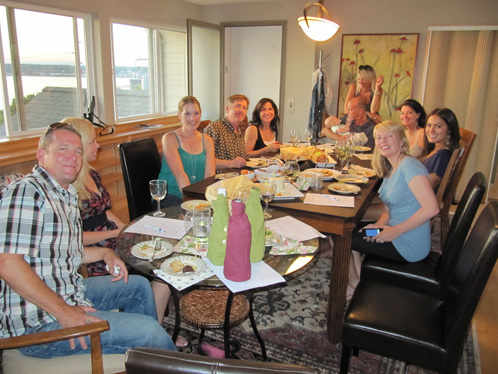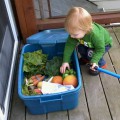Importance of Community
Back in the 1950s—the “Happy Days” of American society—people didn’t talk about the value of community much. They didn’t need to, because they lived it. Most people lived in tight nuclear families, they knew their neighbors, they belonged to neighborhood churches, they participated in local Boy Scout and Girl Scout troops, they were members of school clubs (yes, including glee club!) and local service organizations like the Rotary Club, and people chose a career and stuck with it, often staying at the same job for all their adult life. These were all communities within communities connected to other communities.
 Fabulous community of friends
Fabulous community of friends
Now a days, we often grow up in divided families, move from place to place, rarely know our neighbors, tend to think school and civic clubs are anything but cool, change jobs and careers numerous times, and go to church less than previous generations. Life may be far more interesting these days, but there’s much less of a sense of “this is my group, my tribe, my neighborhood, my community where I belong.”
Within this void has sprung up social media and its many cousins like “gaming” that have created virtual communities where people with like interests and values can meet online and play a role (sometimes literally as in World of Warcraft) in strengthening that community. That said, however, long-distance chatting with someone you know via only a digital photo and limited key strokes can still leave an empty space where a sense of belonging, well, belongs.
We’ve noticed that sometimes a person’s desire to feel like they belong is put down as a sign of insecurity or neediness. It’s not. Humans are social creatures and it’s the most natural, basic thing in the world for us to want to be a member of a tribe, a pack or clan, and ignoring that need can be harmful.
Studies have shown that the happiest and most content people are those who have a secure “sense of community,” of knowing they are valued members of a particular group. Besides contributing to a sense of purpose, community membership also provides emotional (sometimes even fiscal or physical) support during difficult times, thus adding to the wellness benefits of community.
Naturally, community and friendship are closely related. And the two share many of the same health benefits:
- People with strong friendships age better and recover more quickly from illness
- They experience less stress and have better self-esteem
- People with active social lives experience less memory loss as they age
- Overall, they have less mental illness and they live longer
We’ve included “community” as part of our “Say Hello to Health” series because its value to overall health and well-being is often lost in the shadow cast by warnings about the dangers of poor diet and lack of exercise. But a 2010 study by Brigham Young University found that social interaction is more important to overall health than previously presumed. In fact, they suggest that too little social connection is worse than not enough exercise and is twice as harmful as obesity!
We’re not suggesting that if you’re not in a community to run right out and join one. Finding the right community for your unique needs and interests takes time and careful thought. We are suggesting, however, that if you are already part of a community, then make the most of it. We’ve pooled our thoughts together here at Bramble Berry to come up with some of the steps we feel will help you gain the healthiest benefits out of “being in community.”
1. Know what true community should be offering you:
- Shared values and goals, emotional connection and emotional safety
- A sense of membership, of belonging and identification with the group
- Feeling valued, heard and understood
- Mutual respect, cooperation and collaboration
- Open and effective communication
- Shared commitments like trust, acceptance and active participation in community-building
2. Determine to enjoy more community benefits and contribute to group benefits as well:
- What more could you be doing to contribute to the overall good of the community? Communities tend to be holistic and interconnected in nature so that what affects one part of the group affects the whole, and vice versa.
3. Determine if you’re getting what you need and, if you’re not, consider moving on:
- Some of us are members of communities because our families or friends are. But it’s important to periodically take an inventory of our reasons for being a part of that group. Are our needs and values still aligned with the community’s? Are we experiencing the positive benefits that good communities offer? If not, perhaps it’s time to join a different group.
Whether your community is simply the meeting of minds between three people who share a passion for antique music boxes, or perhaps 2000 kindred spirits who happen to love making soap, our desire for connecting through community is woven into our DNA. The following quote certainly moved many of us deeply here at Bramble Berry. Maybe you’ll feel a heartfelt tug toward community through it, too.
“We are all longing to go home to some place we have never been — a place half-remembered and half-envisioned we can only catch glimpses of from time to time. Community. Somewhere, there are people to whom we can speak with passion without having the words catch in our throats. Somewhere a circle of hands will open to receive us, eyes will light up as we enter, voices will celebrate with us whenever we come into our own power. Community means strength that joins our strength to do the work that needs to be done. Arms to hold us when we falter. A circle of healing. A circle of friends. Someplace where we can be free.” –Starhawk
If you’d like to read more about community, you can start with the places we found during our research: Importance of Community, Value of Community, How Friendships Improve Health, Finding Your Tribe, The Heart of a Community, Wikipedia on Community, Building a Sense of Community, Community Building,
Call to Action: Step out of your comfort zone this quarter and meet new people. If stepping out of your comfort zone means saying “Hello” to someone at the grocery store then do it. Make eye contact and give a friendly “Hello“. Or, if you’re feeling more adventurous, try a new activity this quarter, whether it’s visiting a new church, joining a soccer league or starting a book club.
 Find your flock!
Find your flock!
Catch up on previous Hello to Health Blog posts: Day 1: Drink More Water, Day 2: Don’t Drink Your Calories, Day 3: Walk More, Day 4: Eat More Fiber.





Not everyone has a tribe. For years I’ve said hello to most everyone I see in the grocery, on the trail I walk, in public meetings. People most often light up and smile back and say some times comments and sometimes hi, good afternoon, good evening. Since I’m now a certain age sometimes I throw honey in for fun.
Most everyone has a smile!
Great post Anne-Marie! I moved from FL to east TN four years ago and immediately felt like a part of my community. The people here are very friendly and welcoming, even at Walmart! LOL I am a shy person and have always made it a point “step out of my comfort zone” and talk to people I meet. The more you do it, the easier it gets! If I’m in a craft store looking at yarn, I’ll ask whoever happens to be in the aisle their opinion of the colors I’m choosing (even tho I’ve already made up my mind!).
This post couldn’t be more right on. I’m from NYC and I talked to random people on the train and at the supermarket all the time. There are people everywhere and I always felt part of a community. Now I live in Minnesota and feel so isolated. Barely anyone goes out of their comfort zone and heavens forbid if you’re a little different than they are. It is so hard to make true friendships here. Minnesota “nice” is very superficial. Since this isolation has consumed me, I’m very insecure, overly self conscious, and feel very very lonely. My energy level is completely zapped. I never imagined how much of an impact not being “part of a herd” can have on a person.
Oh sweetie, I’m so sorry that you’re having a rough time with your transition. Take heart, many people would probably say the same about NY being a hard place to find friends (I hear it about Bellingham all the time and I think this place is super easy).
I found some of my best friends starting at a book club at Barnes & Noble – a few of us left to form our own book club at our houses – and 10 years later, we’re all still fantastic friends.
Chris and I also host supper parties and wine tastings at our home and the rule is to never invite the same person 2 times in a year. That makes the parties pretty interesting to try and find guests for near the end of the year and I ask people that I barely barely barely even know. I always get nervous before the parties but find that after 30 minutes into the party, it’s easy and smooth sailing.
Good luck finding your tribe. Just keep trying. =) You can do it!
It’s funny you should say that about saying “hi” to people in the grocery store—about 2 weeks ago I decided to start saying hi to more random people, and it’s been really wonderful seeing the response. People are almost shocked to be spoken to (but happy)!
I used to be so embarrassed when my Mom chatted up clerks at the grocery store (true story – I was younger then ….) and now, I find myself doing the same …. which means my kides will be embarrassed about me! Ha ha =)